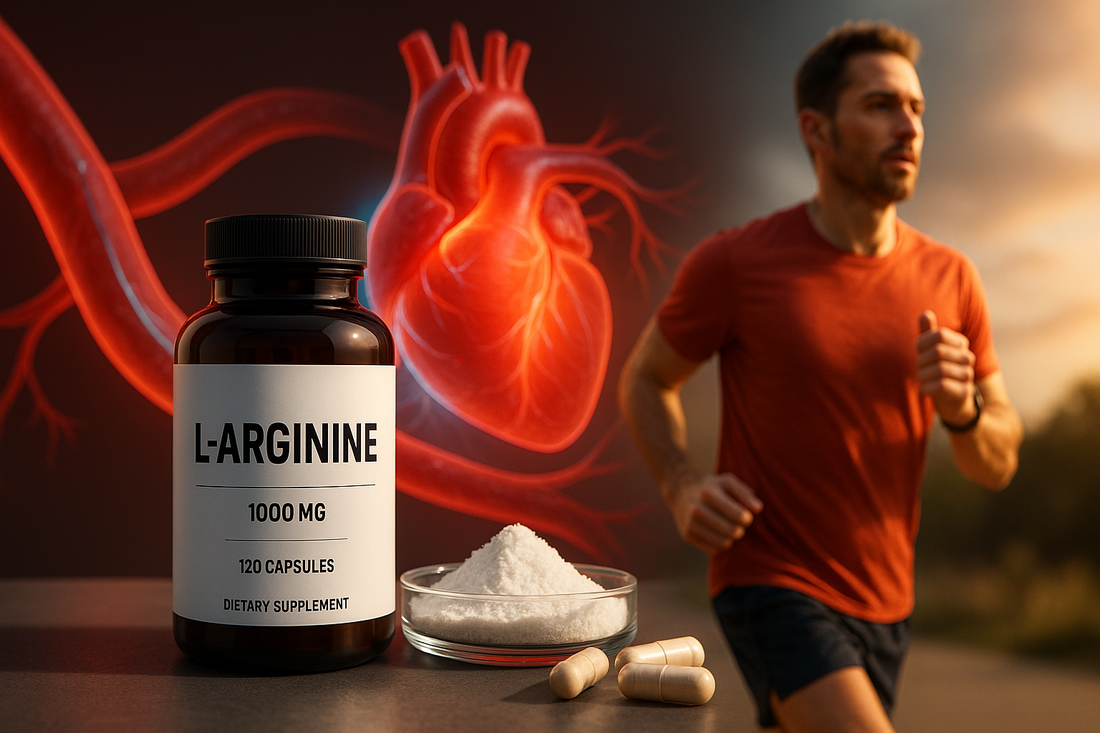
L-Arginine: How This Amino Acid Supports Circulation
Share
Introduction
In the world of health, fitness, and wellness, amino acids are fundamental building blocks that influence numerous bodily functions. L-Arginine is a semi-essential amino acid notable for its critical role in supporting cardiovascular health by enhancing blood flow and circulation. As a precursor to nitric oxide, a vital signaling molecule L-Arginine’s impact on vascular function, endurance, and recovery is profound and backed by a growing body of scientific research.
In this comprehensive blog, we’ll explore how L-Arginine works in the body, why it is essential for healthy circulation, its broader benefits for wellness and athletic performance, and what current science says about its use as a supplement.
What is L-Arginine?
L-Arginine is an amino acid found naturally in protein-containing foods such as meat, poultry, fish, dairy, nuts, and seeds. Although classified as a semi-essential amino acid which means the body can synthesize it certain conditions like stress, illness, or intense physical activity may increase the demand beyond what the body produces.
One of L-Arginine’s most important physiological roles is its conversion into nitric oxide (NO) by the enzyme nitric oxide synthase (NOS). Nitric oxide functions as a powerful vasodilator, relaxing the smooth muscles lining blood vessels to facilitate improved blood flow throughout the body.
The Role of L-Arginine in Supporting Circulation
1. Nitric Oxide Production and Vasodilation
The primary way L-Arginine supports circulation is through its function as a substrate for nitric oxide synthesis. Once converted into NO, this molecule causes relaxation (vasodilation) of blood vessels, which:
- Lowers blood pressure by reducing vascular resistance.
- Improves blood flow to muscles, organs, and tissues.
- Enhances oxygen and nutrient delivery, critical during exercise and daily function.
- Supports endothelial health, the specialized inner lining of blood vessels responsible for regulating vascular tone.
Good endothelial function is essential to cardiovascular health, and compromised endothelial function is an early sign of heart disease and other vascular conditions.
2. Enhancing Athletic Performance and Recovery
L-Arginine’s role in improving blood flow translates to better exercise capacity and recovery. Enhanced circulation means:
- Muscles receive more oxygen and nutrients necessary for optimal performance.
- Metabolic waste products such as lactic acid are cleared more effectively, reducing muscle fatigue and soreness.
- Faster delivery of repair compounds (e.g., amino acids, glucose) speeds up recovery and muscle growth.
Supplementation with L-Arginine is common among athletes, bodybuilders, and active individuals seeking to boost endurance and power output naturally.
Broader Health Benefits Linked to Circulation Support
Cardiovascular Health
By promoting healthy blood vessel dilation and maintaining flexible arteries, L-Arginine can contribute to improved cardiovascular function. Research suggests:
- Potential positive effects on blood pressure regulation, especially in individuals with mild hypertension.
- Support for heart health by improving coronary artery function.
- Possible reduction in the severity of angina (chest pain) by increasing blood flow to cardiac tissue.
Immune Function and Healing
L-Arginine also plays a role in:
- Supporting immune responses it is involved in the production of immune cells and wound healing.
- Stimulating growth hormone release, which in turn promotes tissue repair and muscle recovery.
Sexual Health
Because circulation is a key factor in sexual function, L-Arginine’s vasodilating effects have been studied to help men with erectile dysfunction, improving blood flow to genital tissues.
Natural Sources vs. Supplementation
L-Arginine is found in many protein-rich foods:
- Turkey, chicken, pork, and beef
- Dairy products like milk and yogurt
- Nuts (especially walnuts and almonds), seeds (pumpkin seeds), and legumes
However, dietary intake may not be sufficient in certain conditions such as:
- High physical demand from athletes or those training intensively
- Cardiovascular conditions or endothelial dysfunction
- Aging, where endogenous nitric oxide production is reduced
In such situations, supplementation can help maintain optimal levels and provide targeted support.
Safety and Dosage Considerations
Studies indicate that L-Arginine supplementation is generally safe in moderate doses, typically ranging from 2 to 6 grams per day for circulation and exercise support. Some practical notes include:
- High doses may cause gastrointestinal discomfort or bloating.
- Individuals with herpes virus infections should consult a healthcare provider since arginine can theoretically facilitate viral replication.
- Those on blood pressure or erectile dysfunction medications should seek medical advice to avoid interactions.
Scientific Evidence and Clinical Studies
- Blood Pressure: Meta-analyses show that L-Arginine can reduce systolic and diastolic blood pressure modestly in hypertensive patients.
- Exercise Performance: Research demonstrates improved aerobic capacity, increased time to exhaustion, and decreased perceived exertion in subjects supplementing with L-Arginine.
- Endothelial Function: Several studies document enhanced flow-mediated dilation (FMD) a marker of endothelial health after L-Arginine administration.
- Recovery: Supplementation results in faster clearance of blood lactate and reduced markers of muscle damage.
While more extensive long-term studies are warranted, current evidence supports its use as a natural, effective enhancer of vascular function.
L-Arginine as Part of Holistic Wellness
L-Arginine doesn’t work in isolation. Many effective supplements combine it with other nitric oxide precursors like L-Citrulline, which helps raise arginine levels more efficiently, as well as adaptogens that help counteract stress-related wear on circulation.
In addition, lifestyle factors such as a balanced diet, regular exercise, hydration, stress management, and sufficient sleep play integral roles in maintaining healthy circulation.
Conclusion
L-Arginine is much more than just an amino acid. By acting as a precursor to nitric oxide production, it supports robust circulation, improves cardiovascular health, enhances athletic performance, and aids recovery. Whether obtained through diet or supplementation, optimal L-Arginine levels help ensure that your circulatory system functions at its best, maintaining vitality and resilience in both body and mind.
For anyone aiming to boost their cardiovascular wellness, daily energy, or physical endurance naturally, L-Arginine supplementation especially in scientifically optimized formulas can be a game-changer.





